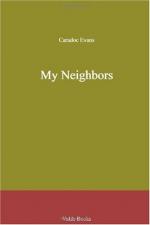“Millie,” he addressed his wife, “look over them and add them together.”
“Wait till I’m done,” was the answer. “The irons are all hotted up.”
Hugh chided her. “You are not interested in my saving. You don’t care. It’s nothing to you. Forward, as I call.”
“If I sit down,” Millie offered, “I feel I shall never get up again and the irons are hotted and what I think is a shame to waste gas like this the price it is.”
“Why didn’t you say so at the first opportunity? Be quick then. I shan’t allow the cash to lay here.”
Duly Millie observed her husband’s order, and what time she proved that which Hugh had done, she was admonished that she had spent too much on this and that.
“I’m doing all I can not to be extravagant,” she whimpered. “I don’t buy a thing for my back.” Her short upper lip curled above her broken teeth and trembled; she wept.
“But whatever,” said Hugh softening his spirit, “I got ten soferens in hand. Next quarter less you need and more you have. Less gass and electric. You don’t gobble food so ravishingly in warm weather. The more I save.”
Having exchanged the ten pounds for a ten-pound note, remorse seized Hugh. “A son of a mule am I,” he said. “Dangerous is paper as he blows. If he blows! Bulky are soferens and shillings. If you lose two, you got the remnants. But they are showy and tempting.” He laid the note under his pillow and slept, and he took it with him, secreted on his person, to Kingsend Chapel, where every Sunday morning and evening he sang hymns, bowed under prayer, and entertained his soul with sermons.
Just before departing on Monday he gave the note to Millie. “Keep him securely,” he counseled her. “Tell nobody we stock so much cash.”
Millie put the note between the folds of a Paisley shawl, which was precious to her inasmuch as it had been her mother’s, and she wrapped a blanket over the shawl and placed it in a cupboard. But on Friday she could not remember where she had hidden the note; “never mind,” she consoled herself, “it will occur to me all of a sudden.”
As that night Hugh cast off his silk hat and his frock coat, he shouted: “Got the money all tightly?”
“Yes,” replied Millie quickly. “As safe as in the Bank of England.”
“Can’t be safer than that. Keep him close to you and tell no one. Paper money has funny ways.” Hugh then prophesied that in a year his wealth in a mass would be fifty pounds.
“With ordinary luck, and I’m sure you desire it because you’re always at it, it will,” Millie agreed.
“No luck about it. No stop to me. We’ve nothing to purchase. And you don’t. At home you are, with food and clothes and a ceyling above you. Kings don’t want many more.”
“Yes,” said Millie. “No.”
Weeks passed and Millie was concerned that she could not find the note, tried she never so hard. At the side of her bed she entreated to be led to it, and in the day she often paused and closing her eyes prayed: “Almighty Father, bring it to me.”




